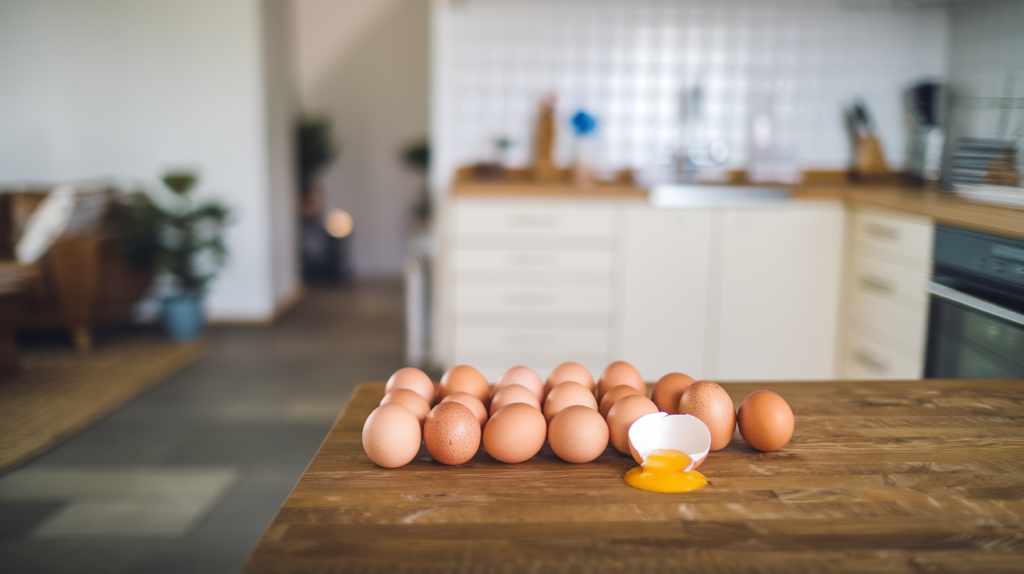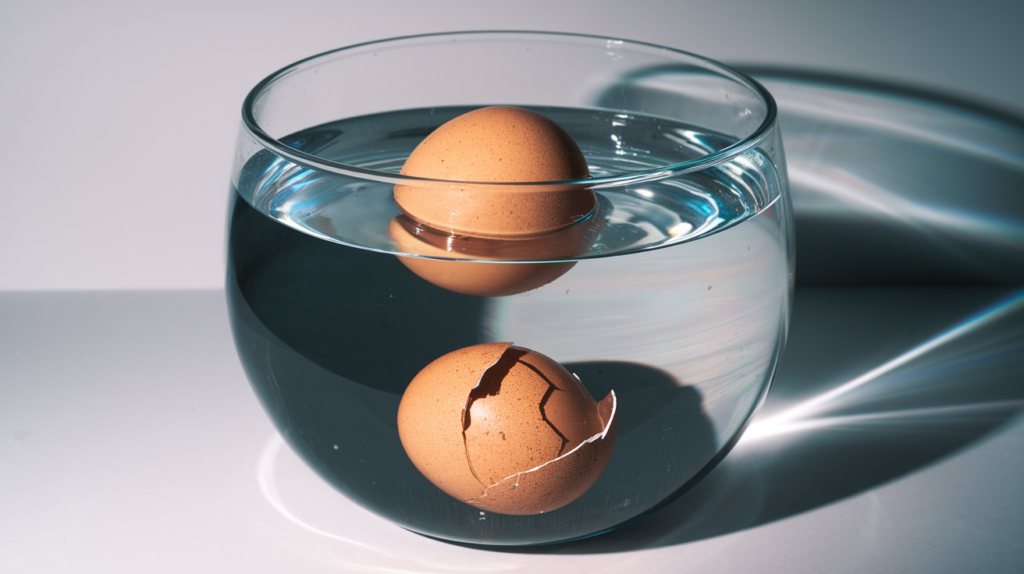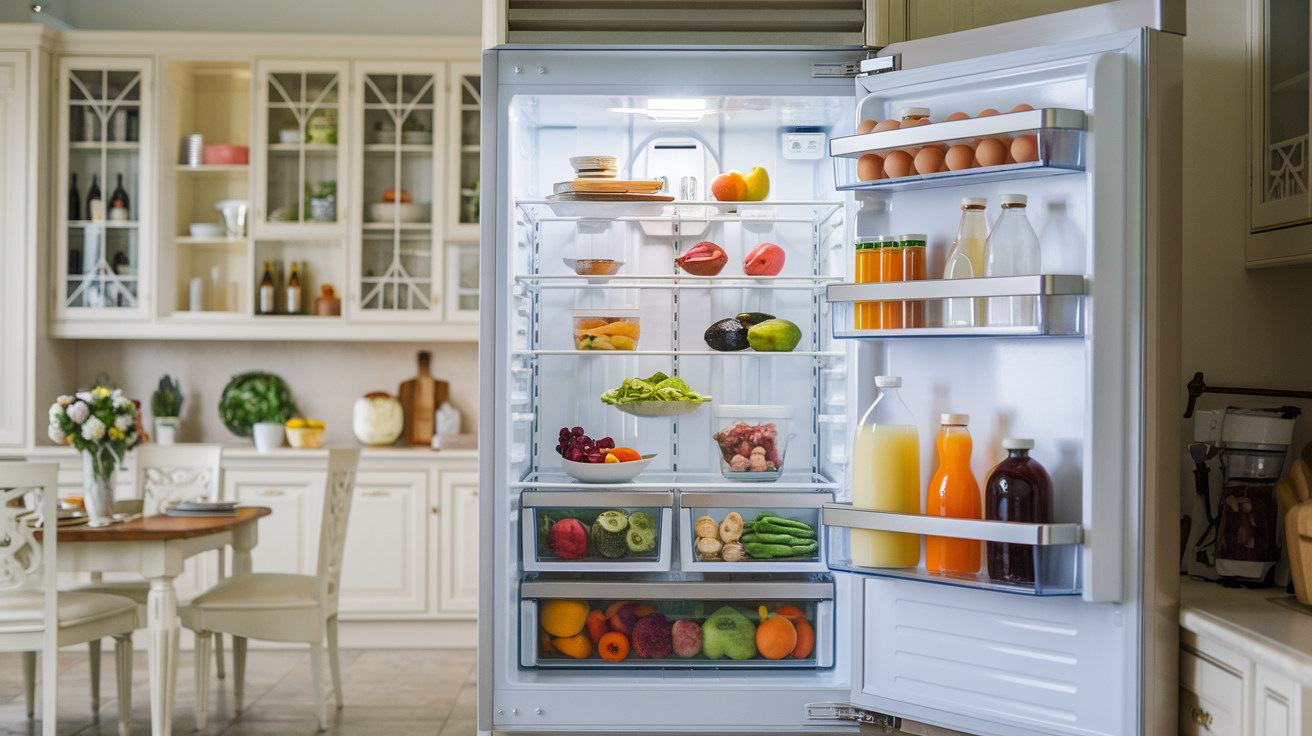Eggs are a staple in most households, whether they’re fried for breakfast, baked into a cake, or boiled for a salad. But how long do eggs last in the fridge? Discover the secrets to egg freshness, storage tips, and how to avoid spoiled eggs.
Why Egg Freshness Matters
Eggs are versatile, but their quality can make or break a dish. Think about it: have you ever cracked an egg and caught a whiff of that unmistakable sulfur-like smell? That’s what happens when eggs go bad. Freshness isn’t just about taste—it’s about safety, too. Supporting your egg storage practices with knowledge about “egg shelf life” and “storing eggs safely” ensures not just better meals, but also fewer food safety risks.
Nutritional Value of Fresh Eggs
Fresh eggs are packed with nutrients. They’re a great source of protein, healthy fats, vitamins, and minerals. But as eggs age, their quality starts to decline. The whites thin out, and the yolk becomes less vibrant. While the nutritional content doesn’t plummet overnight, it’s always best to use eggs when they’re freshest to get the maximum benefits.
Food Safety Concerns with Expired Eggs
Nobody wants food poisoning, right? Eating expired eggs can lead to nasty illnesses caused by bacteria like Salmonella. And trust me, that’s not a gamble worth taking. Keeping track of how long your eggs have been in the fridge is crucial for avoiding any stomach troubles.
“An ounce of prevention is worth a pound of cure—and when it comes to eggs, that means proper storage and regular freshness checks.”

How to Properly Store Eggs in the Fridge
Proper egg storage isn’t just about tossing them into the refrigerator; it’s about “refrigerating eggs” the right way to “keep eggs fresh” and safe for consumption. Adopting these practices ensures your eggs maintain their quality and shelf life.
Now that we know why egg freshness is so important, let’s talk storage. How you store your eggs can significantly impact their shelf life. The fridge isn’t just a place to toss them—there’s a right way to do it.
Ideal Temperature for Egg Storage
Eggs love consistency. Ideally, they should be stored at 40°F (4°C) or lower. This helps slow down the growth of bacteria and keeps the eggs fresh longer. Avoid placing them in the fridge door, though. Why? Because the temperature fluctuates every time you open it. Instead, store them in the main compartment where it’s nice and cool.
The Role of Egg Cartons in Freshness
Did you know the humble egg carton is more than just packaging? It’s designed to protect eggs from absorbing odors and moisture. Always keep your eggs in their original carton rather than transferring them to another container. Bonus: the expiration date stays right there for easy reference.
Should You Wash Eggs Before Storing?
You might think washing eggs before putting them in the fridge is a good idea. But hold on! Washing removes the protective layer on the shell, which can actually make them more vulnerable to bacteria. If you’re buying eggs from the store, they’re already cleaned and ready for storage. For farm-fresh eggs, wash them only right before use.
How to Tell If Eggs Are Still Fresh
Worried about whether your eggs are still good? Don’t fret—there are some simple tricks to figure it out. No fancy gadgets required!
The Float Test
This classic test is as easy as filling a bowl with water. Place the egg in the water and watch what happens:
- If it sinks and lays flat, it’s fresh.
- If it stands upright or tilts, it’s getting old but still usable.
- If it floats, it’s time to toss it. Floating eggs mean air has seeped into the shell, signaling spoilage.
Inspecting the Shell
Take a close look at the shell. Is it cracked or slimy? Cracks can let bacteria sneak in, and slimy shells are a no-go. A clean, intact shell is your best bet for a fresh egg.
Smell and Appearance Checks
Crack the egg into a bowl and give it a sniff. Fresh eggs have a mild, neutral smell. Anything that reeks or seems “off” should go straight in the trash. Also, check the yolk and whites. A cloudy white is fine and even a sign of freshness, but pink or green hues? Nope, toss it.
“When in doubt, throw it out. Trust your senses—they rarely steer you wrong when it comes to spoiled food. 🤢”
Common Problems with Storing Eggs
Even when you’re doing your best, problems can still pop up. Here are some of the most common storage issues and how to handle them.
Cracked Eggs
Accidents happen! Sometimes, you open the carton only to find a cracked egg. So, what do you do? If the crack is small and the membrane isn’t broken, you can still use the egg—but use it soon and cook it thoroughly. For bigger cracks, it’s safer to discard the egg to avoid contamination.
Freezer Storage: Is It Worth It?
Can you freeze eggs? Absolutely. But there’s a catch: freezing whole eggs in their shells isn’t a great idea. The shell can crack, and the texture might not be the same after thawing. Instead, crack the eggs into a freezer-safe container, beat them lightly, and freeze them that way. They’ll last up to a year and are perfect for baking or scrambled egg recipes.
Cross-Contamination Risks
Did you know eggs can absorb odors from strong-smelling foods in your fridge? This happens because their shells are porous. To prevent this, keep your eggs away from pungent items like onions or garlic. Always wash your hands after handling raw eggs to avoid spreading bacteria to other foods.
How Long Do Different Types of Eggs Last?
Not all eggs are created equal when it comes to shelf life. Let’s break down how long you can expect different types to stay fresh.
Raw Eggs
Raw eggs in their shells can last about 3–5 weeks in the fridge if stored properly. Once you crack them open, use them within 2–4 days. Always store cracked eggs in an airtight container to keep them from drying out.
Boiled Eggs
Boiled eggs are a bit trickier. They’ll last about a week in the fridge, but make sure to store them in their shells. Peeled boiled eggs should be eaten within a day or two.
Specialty Eggs (Organic, Cage-Free, etc.)
Specialty eggs like organic or cage-free tend to have the same shelf life as regular eggs. The difference lies in how they’re produced, not how long they last. However, some argue that locally sourced eggs might stay fresher longer due to shorter transport times.
“Remember, the clock starts ticking as soon as you bring those eggs home from the store. Keep track to avoid any unpleasant surprises!”
Tip for Maximizing Egg Freshness
If you want your eggs to last as long as possible, a little extra effort goes a long way. Let’s explore some tips and tricks to kee: them fresher for longer.
Labeling and Rotation Practices
One simple yet effective method is labeling your eggs with the purchase date. This way, you’ll always know which ones to use first. Additionally, practice the “first in, first out” rule: use older eggs before cracking into a new carton. Rotation is key to avoiding waste.
Using Egg Preservation Tools
Have you heard of egg savers or specialized containers? These handy tools provide extra protection and can help extend freshness. Some even come with built-in date markers, so there’s no guesswork involved. They’re especially useful if you buy eggs in bulk.
The Impact of Buying Local Eggs
Local eggs often have a longer shelf life simply because they’re fresher when you buy them. Shorter transport times mean they’ve spent less time sitting on store shelves. Supporting local farmers isn’t just good for your community—it’s good for your fridge, too!

What to Do with Expired Eggs
Got eggs that are past their prime? Don’t throw them out just yet. There are still ways to make use of them, depending on their condition.
Can Expired Eggs Be Used for Anything?
If the eggs have only just expired and pass the float and sniff tests, they’re probably still safe for certain uses like baking. Older eggs also work great for hard-boiling since they’re easier to peel. Just remember: safety first!
Safely Disposing of Expired Eggs
For eggs that are truly no longer usable, disposal is the next step. Consider composting them—eggshells are rich in calcium and make an excellent addition to compost. If composting isn’t an option, double-bag the eggs before tossing them to minimize any odor issues.
“Think of expired eggs as a chance to get creative—just not at the expense of safety.”
FAQS
Here are answers to some common questions that people have about egg storage and freshness.
Can Refrigerated Eggs Be Left Out?
No, it’s best not to leave refrigerated eggs out for more than two hours. Temperature fluctuations can encourage bacteria growth, and once eggs are chilled, they need to stay that way.
How Do Egg Freshness Dates Work?
You’ll often see “sell-by,” “use-by,” or “best-by” dates on egg cartons. The “sell-by” date is for store inventory purposes, while “best-by” and “use-by” dates are more about quality than safety. Eggs can often be safely eaten a few days past these dates if stored properly.
Are Eggs Safe After the Expiration Date?
It depends. As long as the eggs pass freshness tests (like floating, smelling, and inspecting), they’re usually safe to use. Just make sure to cook them thoroughly to eliminate any potential bacteria.
People Also Ask
Here are answers to some common questions that people have about egg storage and freshness.
Can Refrigerated Eggs Be Left Out?
No, it’s best not to leave refrigerated eggs out for more than two hours. Temperature fluctuations can encourage bacteria growth, and once eggs are chilled, they need to stay that way.
How Do Egg Freshness Dates Work?
You’ll often see “sell-by,” “use-by,” or “best-by” dates on egg cartons. The “sell-by” date is for store inventory purposes, while “best-by” and “use-by” dates are more about quality than safety. Eggs can often be safely eaten a few days past these dates if stored properly.
Are Eggs Safe After the Expiration Date?
It depends. As long as the eggs pass freshness tests (like floating, smelling, and inspecting), they’re usually safe to use. Just make sure to cook them thoroughly to eliminate any potential bacteria.
Can You Eat Eggs Two Months in the Fridge?
Eggs stored properly in the fridge can last 3-5 weeks, but two months is pushing it. Use the float and sniff tests to confirm safety. When in doubt, it’s better to discard them.
How Do You Know If an Egg Has Gone Bad?
Signs of a bad egg include a foul smell, slimy or discolored shell, or unusual colors in the yolk and whites. Trust your senses to determine if it’s safe to eat.
Are 3-Month-Old Eggs Safe to Eat?
Three months is generally too long, even for refrigerated eggs. Always perform freshness tests, but eggs this old are likely unsafe for consumption.
How Long Are Refrigerated Eggs Safe to Eat?
Refrigerated eggs are safe to eat for about 3-5 weeks after purchase if stored properly. Beyond that, always test them for freshness before use.
Conclusion
Keeping Eggs Fresh and Safe at Home
Eggs are a kitchen essential, and keeping them fresh doesn’t have to be complicated. By following proper storage practices, checking for freshness regularly, and making use of helpful tools, you can ensure your eggs stay safe and delicious for as long as possible. Whether you’re using eggs for breakfast, baking, or meal prep, a little attention to detail goes a long way. Remember, a fresh egg is not just about taste—it’s about health and safety too. With the right care, you can make the most of this versatile ingredient and avoid unnecessary waste. So go ahead, enjoy your eggs with confidence and crack on!

